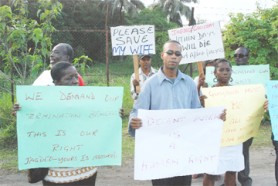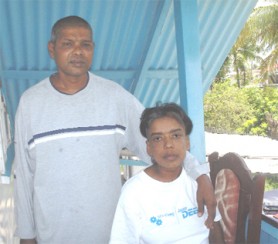‘…if standing for one hour in pain outside a big meeting for important people will get me help then I am prepared to do that. I want to live.’
Almost two years of dialysis and other medical expenses have exhausted the financial resources of Nalini Mohammed and left her desperately fighting to stay alive.
It was this desperation that prompted her and her husband of 14 years, Rasheed Mohammed, to stand in front of the Conference Centre at Liliendaal, East Coast Demerara with placards which read “Save my wife” and “Jagdeo/CARICOM I will die within days, Can’t afford dialysis”.
The distressed couple told Stabroek News yesterday that they were prompted by a businessman to stand peacefully with their placards at the opening ceremony of 30th Meeting of the Conference of Heads of Government yesterday. This, they explained, seemed like a good way to get the attention of the government or anyone who could help.

The woman, her voice weak, said that the Ministry of Health had paid for 20 treatments last year but she has since been unable to get further help. According to an invoice from the 5G Dialysis Centre, Mohammed must receive dialysis three times a week. Each treatment, the invoice said, costs just over $36,000.
“We called the businessman for help and explained that we were at a standstill and weren’t getting any help… We need money for her treatment,” her husband explained.
He said they are going to wait and see what sort of reaction they will get from the appeal. He expressed hope that someone will help his wife since her life depends on steady treatment.
Mohammed was diagnosed in October 2007 with Chronic Kidney Disease [Chronic Glomerulonephritus] and End Stage Renal Disease (ESRD). In November 2007 she was advised by medical practitioners that she needed dialysis to stay alive. Both of her kidneys are failing.
“The doctor told me that I would need dialysis treatment and asked me if I could afford it,” she recalled. “I told him that I gonna try because meh want to stay alive.”
Before her illness Mohammed was a seamstress and her husband was gainfully employed. However, pain and weakness has since limited her physical activities and her husband was forced to leave his job to care for her.
“We have no children and there is no one else to take care of me… sometimes I would fall down in the house and so,” Shivram said.
No donor & rest

The woman has since been advised that she needs to find a kidney donor.
“I been trying for a while to get a donor but nobody ain’t want to help me live,” she said, tears glistening in her eyes. “My husband is willing to give me one of his kidney but if he does who going to take care of who?”
Mohammed explained that she and her husband have no one else to depend on so she is truly “in a fix”. She needs a donor by August when the doctors who are able to perform the surgery will be here.
“Sometimes I does get so confused… is like I don’t know what to do,” she said. “I get tired of asking people for help… is like I turn a beggar now.”
Pointing to her sink stacked with unwashed dishes, Mohammed said she wasn’t even able to do her own household chores. Simple tasks like washing, cooking and cleaning are no longer things she can do. Her husband, she said, does everything for her.
“If it wasn’t for him I don’t know what I woulda do,” she said. “I am sick but I have a wonderful husband and I know I am well loved by him.”
Shortly after she began her treatment, Mohammed explained, a Canadian woman helped her and her husband to open a small shop which Mohammed now operates. The woman, according to Mohammed, wanted them to have a steady source of income so that they would be able to pay their bills.
However, that income is not enough to cover the cost of her treatment and they are often forced to walk from house to house to ask for help. Several people have since contributed to her treatment, she said.
“I wake up about 5 in de morning and do the normal things then I get she something to eat,” the husband said.
As he spoke of their daily routine he fought for control of his emotions. But as he dealt with the fear of his wife dying, her pain and discomfort the tears began to flow. He said she has trouble sleeping.
“When we can’t pay for she treatment some weeks we does can’t sleep,” Rasheed Mohammed said. “We does wake up at all hours of the night and she does be crying and saying how she going to die.”
The man, looking at his wife for a long moment, said that the worst part of their “problem” is that he has what his wife needs to stay alive but circumstances are preventing him from giving it.
“I can give she one of me kidney but who we going to get to look after we when all two ah we in de hospital,” the distressed man queried.
The 36-year-old woman has trouble walking even short distances. Her entire body appears to be swollen and patches of discoloration were visible on her arms and legs yesterday. Sleep, the woman said, was perhaps the hardest task for her. Worry, although it clogs her mind all day, fiercely attacks her at night.
She said that if she ever regains her health and strength the first thing she will do is get a “good long rest.
“I could hardly walk on my swollen feet that day [Thursday],” she said. “But if standing for one hour in pain outside a big meeting for important people will get me help then I am prepared to do that. I want to live.”





